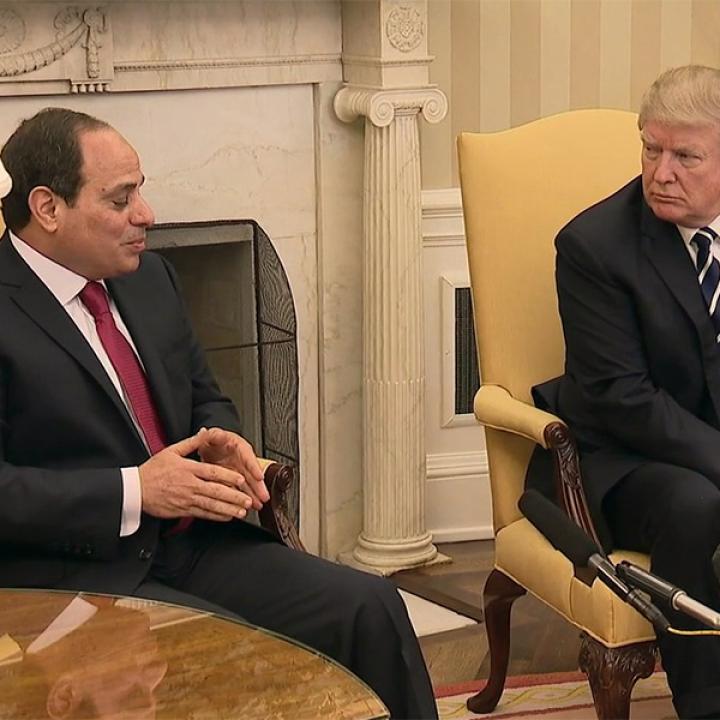
- Policy Analysis
- Articles & Op-Eds
Egypt's Awkward Reset with Washington

After Trump welcomes Sisi, the Syria crisis puts relations in sudden limbo.
Egyptian President Abdel Fatah al-Sisi started the week as Washington's guest of honor. President Trump warmly praised Sisi for doing "a fantastic job" in the Oval Office on Monday, and Sisi tied up Georgetown traffic for the next three days as he shuttled around the capital. Yet Sisi returned home on Thursday empty-handed and overshadowed, as Trump heeded Jordanian King Abdullah's views on Syria and ordered strikes last night despite Sisi's misgivings.
To be sure, Sisi's visit was all about receiving -- and showcasing -- the big Beltway hug. For the past four years, Cairo sulked as the Obama administration held the autocratic Sisi at arm's length: President Obama reacted coolly when Sisi ousted Muslim Brotherhood leader Mohamed Morsi in July 2013, withheld military aid three months later, and then declined to invite Sisi to Washington after he won a barely contested presidential election in May 2014. So from Egypt's standpoint, this week's White House welcome and Capitol confabs were accomplishments in their own right, signaling back home that Washington -- now under new management -- supports Sisi.
But the goodwill tour didn't yield any immediate goods. Sisi received no new military or economic aid, nor did the Trump administration renew the financing mechanism that allows Egypt to order expensive weapons systems on credit. Meanwhile, ministers in Sisi's entourage pressed the American business community for more investments, but returned home without any new contracts. And despite Cairo's persistent lobbying for Washington to designate the Muslim Brotherhood as a terrorist organization, the Trump administration took no such action. Moreover, as Sisi's visit progressed, Cairo's disagreements with Washington widened, particularly on Syria. Only last week, White House spokesman Sean Spicer called Syrian dictator Bashar Assad "a political reality that we have to accept," and Sisi defended Assad during an interview with Fox News on Tuesday.
But the Assad regime's chemical weapons attack that same day, which killed dozens of civilians, convinced President Trump to consider a different approach -- and he was in listening mode when Jordanian King Abdullah visited him on Wednesday. Indeed, during their joint White House press conference, Abdullah told Trump that Syria's chemical attack reflected "the failure of international diplomacy to find the solutions to [the Syrian] crisis," apparently alluding to former president Obama's failure to enforce his own "red line" after the Assad regime used chemical weapons in 2013. And in an interview with the Washington Post, the King emphasized "the moral obligation as members of the international community to fight this horrendous tragedy that is befalling civilians in Syria."
On Thursday night, Trump apparently took this into account when he ordered airstrikes on the Syrian airbase from which Assad launched his chemical attack. Amman responded supportively, with the Jordanian foreign minister tweeting that the U.S. strikes were a "necessary & appropriate response to Syrian regime targeting of innocent civilians and atrocities," and urging a quick pivot toward diplomacy.
Cairo, by contrast, responded coolly, expressing its "great concern" and urging the U.S. and Russia to cooperate in resolving the Syrian crisis. Egypt's hedge isn't surprising, of course: Sisi has deepened his country's relationship with Russia in recent years through weapons purchases and joint military exercises, and he therefore can't endorse an American attack on the Russian-backed Syrian regime.
If tensions between the U.S. and Russia worsen over Syria, Sisi's White House visit this past week might be the high point of his "new beginning" with Washington.
Eric Trager is the Esther K. Wagner Fellow at The Washington Institute and author of Arab Fall: How the Muslim Brotherhood Won and Lost Egypt in 891 Days.
New York Daily News



